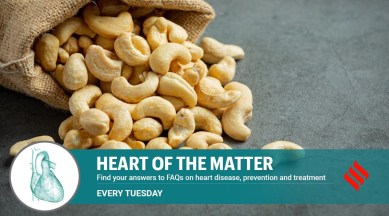Why cashew nuts can reduce bad cholesterol and prevent heart attacks and strokes: It is a zero cholesterol food
Peanuts and cashew nuts have zero cholesterol. In fact, cashew nuts can not only lower bad cholesterol or LDL but prevent heart disease due to their high magnesium content. Eggs lower LDL too. Dietary cholesterol contributes one-third of the total cholesterol in your blood, so it is not the only monster, says Dr Nishith Chandra, Principal Director, Interventional Cardiology, Fortis Escorts Heart Institute, Delhi

It is usually believed that dietary cholesterol elevates cholesterol levels in the blood and consequently the risk of heart disease. But recent research has shown that dietary cholesterol is not associated with an increased risk of heart disease. In fact, blood cholesterol can be the result of its overproduction in the liver. In other words, you need not worry about having an egg a day, thinking it would alone elevate your cholesterol counts.
How are dietary cholesterol and blood cholesterol different?
monthly limit of free stories.
with an Express account.
Dietary cholesterol is the amount of cholesterol you consume, the other is existing cholesterol concentration in the blood. Dietary cholesterol contributes one-third of the total cholesterol count in your blood. The remaining two-thirds is produced by the liver. Now if this level goes up, it is because of over-production by the liver. That’s why some of my patients tell me, “Doctor, I don’t eat fatty foods but still my blood cholesterol is high.”
Dietary cholesterol comes from animal-based foods, usually meat, eggs, butter and full-fat dairy products. You would find it abundantly in processed meats, sausages, burgers and even baked goods. But these are to be had in moderation for good health and in very measured amounts if you have comorbidities or are genetically prone to higher cholesterol or your liver generates higher levels.
What are the myths about dietary cholesterol?
There is a myth that nuts contain cholesterol. But none of them have any cholesterol at all. All animal products like milk, butter, cheese and eggs contain cholesterol. Peanuts and cashewnuts, too, have zero cholesterol. In fact cashew nuts can not only lower bad cholesterol but prevent heart disease due to their high magnesium content. Magnesium is known to reduce chances of ischemic heart disease and stroke.
The other myth is that eggs are bad for the heart. In fact, one egg, including its yolk, is okay for the heart. The yolk has 180 milligrams of good cholesterol. Several studies have shown that eating them does not raise the risk with some of them suggesting that eggs may even help improve your lipoprotein profiles, increase HDL, decrease LDL and lower your risk.
How much dietary cholesterol can I eat?
You can safely take100 to 200 milligrams daily, assuming all your counts and markers are within the normal range. But if these are on the higher side, then minimise the intake. Remember, you must eat in moderation. Besides, some animal foods with cholesterol are also high in saturated fat. Exceptions are eggs and shellfish.
What are the other triggers for cholesterol?
When you have a higher count of stress hormones, such as cortisol and adrenaline, they raise blood sugar and induce inflammation. Over time, this may cause your liver to pump out more cholesterol.
Certain medications like birth control pills, retinoids, corticosteroids, antivirals, anticonvulsants can also raise your cholesterol and may need some tweaking. The hormones produced by your thyroid glands remove the extra cholesterol that your body doesn’t need. So, when you have an underactive thyroid, or hypothyroidism, your levels of total and LDL cholesterol go up.
Type 2 diabetes is characterised by high blood sugar, which attaches itself to proteins, such as cholesterol molecules, particularly the small, dense LDL (low density lipoprotein) particles, which raise the risk of heart disease. That’s because stress hormones, such as cortisol and adrenaline, trigger changes that may lead to higher blood sugar and inflammation. Over time, this may cause your liver to pump out more cholesterol and blood fats or triglycerides. If you have a sedentary life and sit for long periods of time, then the enzyme that neutralises harmful LDL cholesterol and elevates the good cholesterol or HDL (high density lipoprotein) drops by 95 per cent. Then there are issues like obesity, which affects the way your body makes and manages lipoproteins, including cholesterol and triglycerides.
In fact, normal levels of cholesterol can also form plaques when there is inflammation in the body. Lifestyle diseases wear out the endothelium or the outer layer of blood vessels in the heart. A tear means blood rushes in to repair it and clots over a harmless cholesterol deposit to form a big block, This, in turn, triggers a heart attack.
How do I know that I have a genetic tendency to produce higher levels of cholesterol?
For that, you need to do a lipid profile and a liver function test every six months. That gives cardiologists a fair idea about your liver functioning and they decide whether the organ is over-producing cholesterol. Then the doctor would put you on statins. But do not self-medicate as statins are easily available over the counter.
You can reduce plaque buildup by the cliched but effective formula of moderate aerobic exercises, eating more fruits and green leafy vegetables, approximating a Mediterranean diet, which is rich in olive oil and proteins, and ensuring proper sleep.